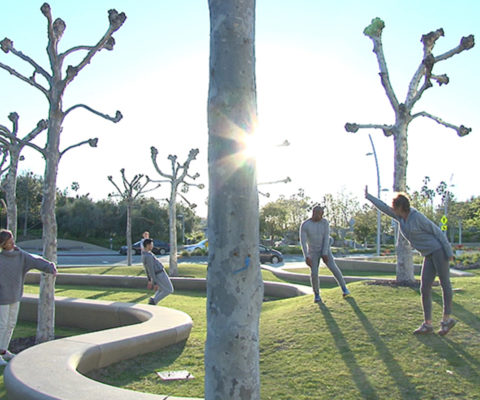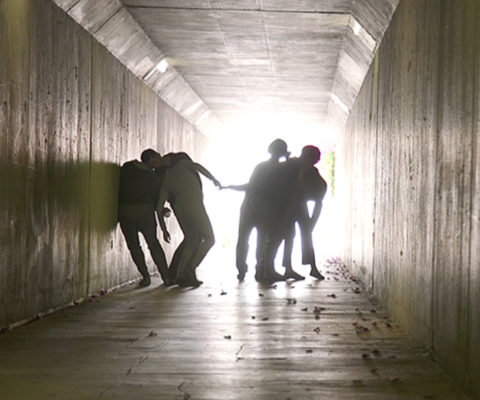- photo credit: Carole Kim
- photo credit: Fulcrum Arts
- photo credit: Meena Murugesan
LEI Artistic Director / Co-Founder: Nina Waisman
LEI Movement Expert / Co-Founder: Flora Wiegmann
The Laboratory for Embodied Intelligences is an ongoing series of experiments in using our bodies to learn from other creatures, together with scientific research and data about these creatures’ behaviors. Combining movement and scientific research, we are learning new ways to perceive, communicate, move, collaborate, and make decisions from other species so that we might avoid destroying ourselves and all other life on this planet. We bring artists, scientists and community members together to learn from and dialogue with each other about their own particular research on physical behaviors, sociality, communication, and intelligence – at many scales and from a range of cultural angles. We feel that any attempt to consider non-human intelligence requires dialogue amongst a wide spectrum of perspectives.
Background:
Waisman had spent a year in the SETI Institute’s Artist in Residence Program (The Search for Extra Terrestrial Intelligence). Her time there culminated in her creation of an intimate, 2-week think tank at Montalvo Arts Center, gathering NASA, SETI Institute, Stanford, MBARI & NYU scientists together with artists, dancers and other researchers in intelligence called Intelligence Moves. The resulting conversations, presentations and experimentation sparked a new collaboration between Waisman and I– to formalize an umbrella under which scientific+embodied experimentation could unfold. LEI was founded in 2016.
Our initial focus:
We began to experiment in the studio with dancers and movers based on findings regarding microbes. Why explore microbial behaviors?
All earthly life forms evolved from microbes – that means that perceptions and communications in plants and animals (including humans) are built upon a scaffolding of the perception, communication and movement capacities given to us by microbes. Since they have survived on Earth for over 3.5 billion years, perhaps we could learn more sustainable ways from our long lasting and adaptive elders, i.e. microbes and every other life form on the planet – before we extinguish most of them.
Astrobiologists agree that the most likely and prevalent life we will find out in space will be microbial. Why not then look into their possible intelligence here on earth, so we might better anticipate who we’ll be communicating with out in space?
Microbes collaborate with other organisms – including us. In and on your body, you’ll find 100 times more microbial DNA than human DNA. Many of these microbes are in intimate contact with your “second” brain – the 100 million gut-located neurons that deeply impact your moods and thinking by controlling the other brain in your head. Maybe microbes are the masters of not just the atmosphere, soil and water, but also us.
We set out to examine their intelligence, by leaving behind our human minds and bodies and taking on their physicality, their systems for communication and logic and their ways of moving through space. We then taught these microbial skill sets to various (non-dancer) participants through public workshops. By using our bodies to mirror microbial ways, we aimed to learn something about microbes beyond the research data. Feedback along the way has been illuminating: participants could comprehend viscerally another organism’s intelligence, they experienced amplified sensorial information, and temporarily left behind the confines of their own human form. The expert microbiologists with whom we worked were interested in our approach, sharing their research and feedback all along the way.
“If you push novelty of language and metaphor far enough, you can end up with a new way of seeing [which] can in its own right make an original contribution to science.” — Richard Dawkins
Lastly, this work aimed to activate humility, wonder and awe within the moving body, and perhaps, conjure the same feelings for those watching. These microbial skills were presented in performances, workshops and presentations around the Los Angeles area.
“As ecologist Fritjof Capra advocates in his “systems view of life,” the only possibility for the human species to survive is to build and nurture sustainable communities, enabled by reciprocal networks of communication. Theatre may well contribute to this deep cultural ecology by creating living artworks that headline such pressing, if less ostentatious issues as ecology, global warming, artificial intelligence, inequitable, distribution and depletion of our terrestrial resources, and the promise of interstellar migration. In this light LEI offers us a contemplative theatrical timespace, to experience spectacles of covert relevance, making visible our unseen familiar.” — Meiling Cheng, University of Southern California, Theater Journal, Vol. 70 No. 1, 2018.
Sleepless at the Music Center Free Radicals: Art + Science + Culture developed by the Music Center and Fulcrum Arts. July 2018.
Fulcrum Arts and Goldenvoice present: Microcosmos: Intelligence Moves at the Arroyo Seco Weekend Festival in Pasadena. June 2018.
Movable Lab Residency, A Series of site-specific performances and workshops throughout Santa Monica presented by 18th Street Arts Center. April-June 2017. Video of the tunnel performance HERE.
Artist talk during the symposium Free Radicals: Evolving Perspectives on the Convergence of Art & Science, a symposium as part of Fulcrum Arts’ AxS (art + science) Initiatives. July 7-8, 2017.
Art in Real Life at the Hammer Museum, performances and workshops. January 2017.
Read a text by Meling Cheng, Theatre Journal, Volume 70, Number 1, March 2018, pp. 83-85 (Review)
Many thanks to all of the performers/collaborators who participated in these projects:
Vanessa Baish, Miles Brenninkmeijer, Jonathan Bryant, Jamie Carr, Alfonso Cervera, Hyosun Choi, Madison Clark, Venus Fields, Kearian Giertz, Maya Gingery, Kai Hazelwood, Colleen Hendricks, Sarah Jacobs, Spencer K Jensen, Hyoin Jun, Michelle Lai, Carol Mcdowell, Natali Micciche, Samantha Mohr, Murphia Moore, Nguyen Nguyen, Jasmine Orpilla, Gabriela Simon, Juliana Snapper, Micaela Taylor and Michelle Sui
Carmina Escobar (vocalist) at the Music Center
Milan DelVecchio (costumes) for the Music Center and Arroyo Seco Weekend
And the Scientists who participated in these select events:
Penelope Boston, Director, NASA Astrobiology Institute (NAI)
Moh El-Naggar, USC Robert D. Beyer Early Career Chair in Natural Sciences
Fathi Karouia, Senior Research Scientist at NASA
as well as those who participated in Intelligence Moves think tank who can be found HERE
Generous funding and support provided by:
The Lucas Artists Residency Program at Montalvo Arts Center
18th Street Arts Center
City of Santa Monica Cultural Affairs Department
The California Arts Council
The James Irvine Foundation
The Hammer Museum
The Music Center/Los Angeles County
Goldenvoice
SETI Institute Artist in Residence Program


